Publications
For submission of articles or Working Papers to CEsA, please send an email to:
comunicacao@cesa.iseg.ulisboa.pt
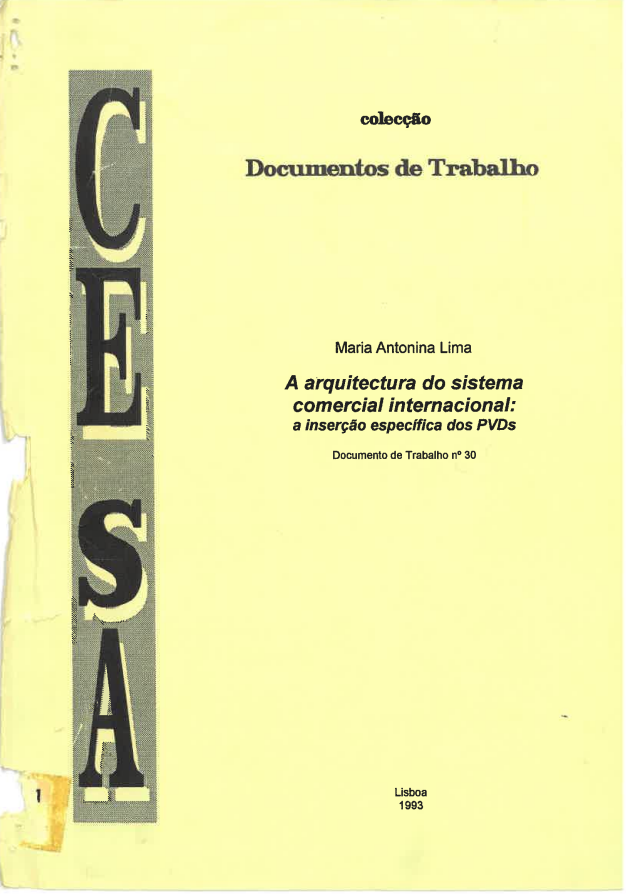
Working Paper 30/1993: A arquitectura do sistema comercial internacional: a inserção específica dos PVDs
Abstract:
We can speak of the constitution, at the level of the world economy, in the post-World War II of an International Commercial System (ICS), the cornerstone of which is GATT – General Agreement on Tariffs and Trade. The principles on which the ICS is based are, through GATT, the benefits that theoretically derive from the practice of free trade in international commercial relations. Over the last decade, however, GATT practice has been moving away from the initial conceptions of free trade. Thus, GATT has progressively appeared as a manager of the new forms of protectionism. In parallel the character the character of GATT has evolved in a radical way: it is not only trying to regulate trade measures at the border, but also trying to “normalise” trade policies that have secondary effects on trade flows (TRIMS and TRIPS). The purpose of A arquitectura do sistema comercial internacional : a inserção específica dos PVDs, is to outline the main trends in the evolution of the ICS: disarmament of tariffs, establishment of GSPs, non-tariff barriers and regional integration.
Quotation:
Lima, Maria Antonina .1993. “A arquitectura do sistema comercial internacional : a inserção específica dos PVDs” . Instituto Superior de Economia e Gestão. CEsA – Documentos de Trabalho nº 30/1993.
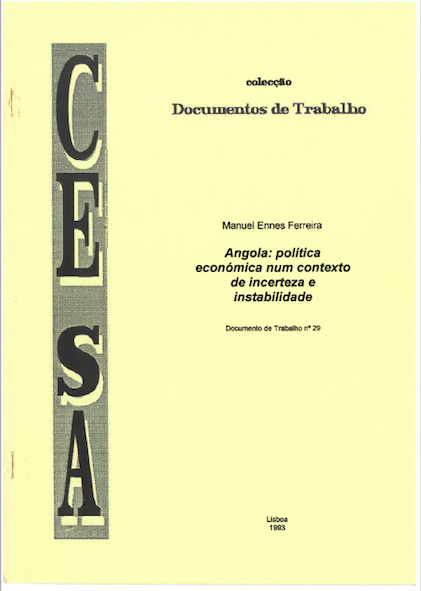
Working Paper 29/1993: Angola: política económica num contexto de incerteza e instabilidade
Abstract:
Angola: política económica num contexto de incerteza e instabilidade covers the period of the First Republic in Angola (1975 to September 1992). Its main objective concerns Angolan economic policy: its context, its implementation and conditioning factors. The presentation will be made in two interconnected phases: the first, descriptive, the second, more analytical. In both situations, the aim is to show the implications and limitations that arise for economic policy from the consideration of factors of uncertainty and instability which, throughout the period under analysis, have increased in intensity. A systemic approach to Angolan economic policy is proposed, in which it can only be understood as a function of the domestic economic, social, political, military and international environment. Within the framework of the Angolan political and economic system that prevailed during the First Republic (November 1975 to September 1992) the one-party system and the state’s tutelary action in the economic domain reigned supreme. The definition of economic and social development objectives and of the economic policy to be applied always took place during the institutional ritual typical of these situations, where Party/Government/State were confused.
Quotation:
Ferreira, Manuel Ennes. 1993. “Angola: política económica num contexto de incerteza e instabilidade”. Instituto Superior de Economia e Gestão. CEsA – Documentos de Trabalho nº 29/1993.
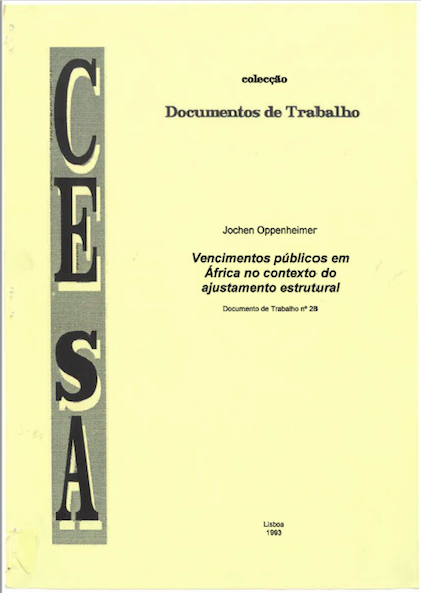
Working Paper 28/1993: Vencimentos públicos em África no contexto do ajustamento estrutural
Abstract:
We analyse, in Vencimentos públicos em África no contexto do ajustamento estrutural, the evolution of civil service wages and staffing in African countries (excluding the productive public sector) in a context of wage restraint and in a comparative perspective. We will try to highlight some of the reasons why “less State” (in budgetary terms) is not necessarily equivalent to “better State” (in terms of efficiency). To this end, in the first part, we will make a comparison between the number of public employees and wages in developing countries and OECD countries. The second part will be an analysis of the African public payroll and salaries, and the following parts will present examples from selected African countries (Mozambique, Tanzania, Uganda), addressing in more depth the tensions and trade-offs between ‘less state’ and ‘better state’ in African socio-economic and cultural contexts. The conclusion will highlight some theoretical implications of the analysis presented. In this text, we will analyse the evolution of civil service personnel and salaries in African countries (excluding the productive public sector) in a context of wage restraint and in a comparative perspective. We will try to highlight some of the reasons why “less State” (in budgetary terms) is not necessarily equivalent to “better State” (in terms of efficiency). For that purpose, we will compare, in a first part, the number of public employees and wages in developing countries with those in OECD countries. The second part will be an analysis of public employees and salaries in Africa, and the following parts will present case studies of selected African countries, focusing on the tensions and trade-offs between ‘less state’ and ‘better state’ in African socio-economic and cultural contexts.
Quotation:
Oppenheimer, Jochen.1993. “Vencimentos públicos em África no contexto do ajustamento estrutural”. Instituto Superior de Economia e Gestão. CEsA – Documentos de Trabalho nº 28/1993.
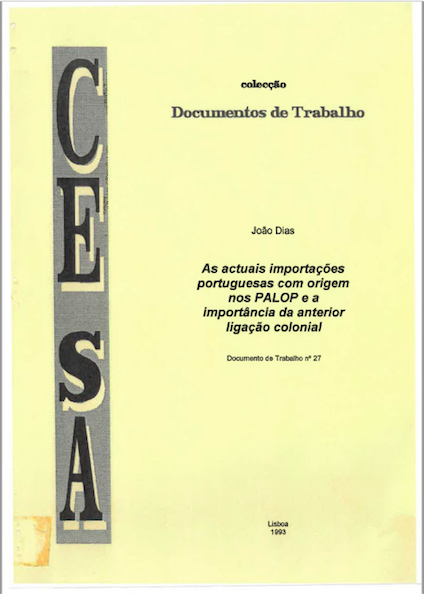
Working Paper 27/1993: As actuais importações portuguesas com origem nos PALOP e a importância da anterior ligação colonial
Abstract:
In As actuais importações portuguesas com origem nos PALOP e a importância da anterior ligação colonial we discuss current Portuguese imports from the PALOP countries are rather small, representing together only about half a percentage point of the total. If we exclude oil imported from Angola, the importance of the PALOP countries falls even further, representing, in 1990, a mere 0.1 per cent of non-fuel Portuguese imports. These figures contrast sharply with those observed for the period prior to decolonization, when the PALOP accounted for percentages in the range of 10 to 15 per cent (appendix 1). Naturally, this drop is understandable in view of the break occurred in 1974-75 and is not, moreover, an exclusive phenomenon of the late Portuguese decolonization. In France, the United Kingdom, the Netherlands and Belgium, too, the former colonies now account for a minimal share of the respective imports. The reduction in the role of the ex-colonies as suppliers to the ex-metropolis also corresponds to a decline in the importance of the Portuguese market as a destination for PALOP exports, although here the contrast between the pre- and post-independence situation of these countries is less marked. In any case, only in the case of Guinea Bissau and Cape Verde does Portugal now absorb more than 10% (in this case, between 20 and 30%) of their total exports. Despite the low levels of PALOP exports to Portugal mentioned at the beginning of the text, the figures involved must, of course, be analysed taking into account the particular relationships involving these countries in the past and the projection of these relationships in the specific ties that still link them in the present. A decade after the independence of the PALOP countries, the influence of these ties translates into a value of their exports to Portugal between thirty and fifty times what would be expected in the absence of such ties. Naturally, the existence of trade presupposes the availability of products to be exchanged, and these exports would have a different expression if the PALOP’s offer were broader, including a wide range of manufactured products. This has to do with economic development (and the absence of internal armed conflicts).
Quotation:
Dias, João .1993. “As actuais importações portuguesas com origem nos PALOP e a importância da anterior ligação colonial”. Instituto Superior de Economia e Gestão. CEsA – Documentos de Trabalho nº 27/1993.
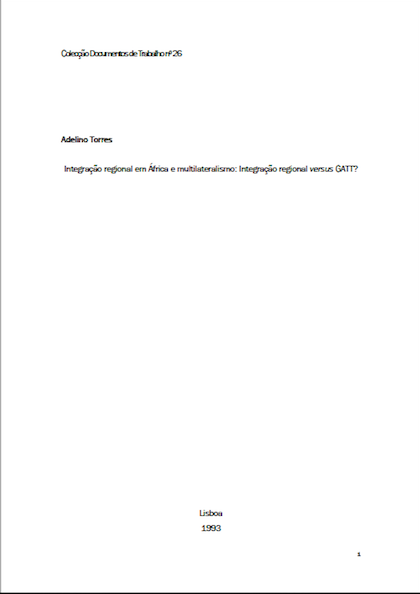
Working Paper 26/1993: Integração regional em África e multilateralismo: Integração regional versus GATT?
Abstract:
In Integração regional em África e multilateralismo: Integração regional versus GATT? we discuss regional integration in Africa and the insertion of African economies in the global space through multilateralism are central issues for the African continent. However, the process of regional integration, which began in Africa about two decades ago, has proved to be disappointing despite some (modest) progress at the CEAO level, at the same time that the share of African exports in world exports has been decrease, with the consequent marginalization of the continent in the international economy. We defend, first of all, in this text that the African continent should reinforce the aspect of regional integration, without ever losing sight of its inclusion in the trade flows of the world economy. Regionalization thus appears as a transitional means, a preparatory phase during which African economies will have to undergo radical transformations, both economically and politically. Regional integration is a sine qua non condition for African development, but everything suggests that it is an insufficient condition in the medium and long term. The text evokes just some of the issues that underlie the debates between multilateralism and regional integration. In addition to the real or apparent dichotomies, the possible theoretical and practical solutions present a degree of complementarity that deserves to be deepened, not only in terms of the indispensable technical measures, but above all in terms of the concepts inscribed in the theory of knowledge that serve as a reference for them.
Quotation:
Torres, Adelino. 1993. “Integração regional em África e multilateralismo: Integração regional versus GATT?”. Instituto Superior de Economia e Gestão. CEsA – Documentos de Trabalho nº 26/1993
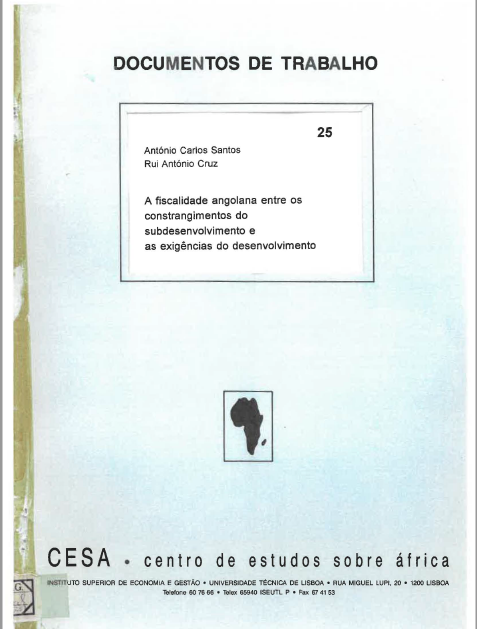
Working Paper 25/1993: A fiscalidade angolana entre os constrangimentos do subdesenvolvimento e as exigências do desenvolvimento
Abstract:
The determining factor of Angolan taxation from the beginning of colonial times to the present day has been the permanence, albeit with different characteristics, of a situation of underdevelopment. In fact, the way in which the Angolan tax system has evolved is deeply marked by this reality. But if this is the main feature of continuity, other factors exist that allow the establishment of ruptures or discontinuities and thus legitimize the possibility of talking about different phases of the system’s evolution. It has long been known that there is a strong correlation between the development process (socio-economic, political) and the structure and technique of tax systems. In A fiscalidade angolana entre os constrangimentos do subdesenvolvimento e as exigências do desenvolvimento we look upon several constraints arising from underdevelopment thus weigh on tax systems. Among them, the existence of small and poorly diversified tax bases, the difficulties in taxing real income, with permanent recourse to presumption methods, the unreliability of accounting systems, the almost always excessive weight of taxes on foreign trade can be mentioned. , the difficulties in administering taxes due to the lack of qualified personnel and technical, IT and logistical resources, with the consequent increase in tax evasion, the incipient tax awareness of taxpayers and the deficient juridification of the sector in its various facets (legislative technique, information legal, doctrinal elaboration, role of the courts, guarantees of taxpayers, etc.). Angola did not escape these characteristics.
Quotation:
Santos, António Carlos e Rui António Cruz. 1993. “A fiscalidade angolana entre os constrangimentos do subdesenvolvimento e as exigências do desenvolvimento”. Instituto Superior de Economia e Gestão. CEsA – Documentos de Trabalho nº 25/1993.
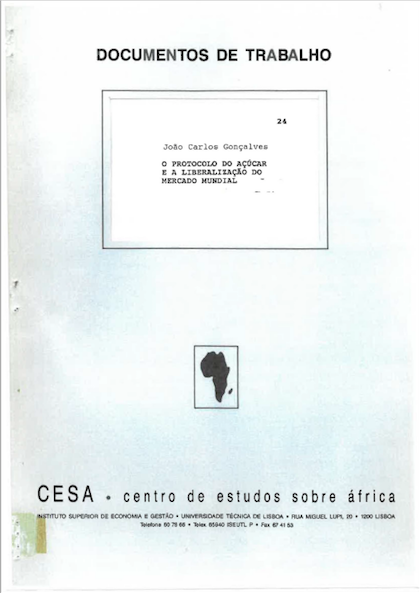
Working Paper 24/1992: O protocolo do açúcar e a liberalização do mercado mundial
Abstract:
O protocolo do açúcar e a liberalização do mercado mundial is justified by the importance that is currently given to the negotiations of the 8th GATT Conference, and their likely implications for the Common Agricultural Policy and for the ACP countries that maintain a close commercial relationship with the Community, embodied in the Lomé agreements. The objective is fundamentally to determine the possible implications for the ACP countries of the liberalization of agricultural trade, in terms of the sugar product. For this, we will analyze a set of indicators related to sugar production, export volume, level of Gross Domestic Product, export quotas and productivity levels for each of the ACP countries with a quota in the Sugar Protocol. The conclusions that may be drawn from this research will always have to take into account the time frame of statistical data availability, which in most cases refers to 1985 or 1987 as the closest years. The methodology that was followed essentially sought to ensure an evolution in the analysis. Starting from the characterisation and importance of the Sugar Protocol in the economies of the ACP countries and raising certain questions that the ACP countries face with regard to the future of their sugar sector, an attempt was made, by comparing hypotheses on world market sugar prices, to determine which ACP countries are in the best position to support a liberalisation of the world sugar trade.
Quotation:
Gonçalves, João Carlos. 1992. “O protocolo do açúcar e a liberalização do mercado mundial” . Instituto Superior de Economia e Gestão. CEsA – Documentos de Trabalho nº 24/1992.
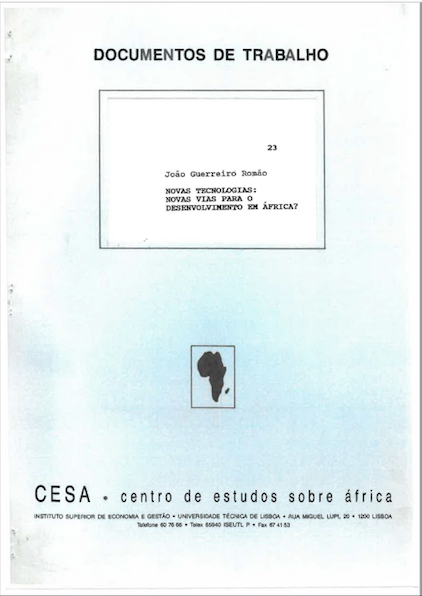
Working Paper 23/1992: Novas tecnologias: novas vias para o desenvolvimento em África
Abstract:
As the title of this work suggests, the aim is to assess to what extent new technologies are the best option for the development of African countries. The question of technological options as an instrument of economic development has already been addressed many times, without much success in terms of results: underdevelopment is far from being overcome. It is therefore not a matter of consensus. In an increasingly globalised world, where a wide variety of factors influence each phenomenon, uncertainty and unforeseen evolution call into question all theoretical formulations, all concepts, even the legitimacy of the questions we raise. The overwhelming victory of doubt in this, as in most fields. It then becomes urgent to review and criticise our heritage of theoretical formulations and, by posing new questions, to find new ways of approaching an old problem. This is what it is about Novas tecnologias: novas vias para o desenvolvimento em África: the framework was defined (diagnosis of technological underdevelopment and listing of the main questions facing technological choices) and a critique of the answers given so far was made in order to try to start a new approach, incorporating relatively new concepts. In this new framework, an answer is sought. Doubtful, always. But it tries, in the field of technological choices, to synthesise new ideas to find new paths.
Quotation:
Romão, João Guerreiro .1992, “Novas tecnologias: novas vias para o desenvolvimento em África” . Instituto Superior de Economia e Gestão. CEsA – Documentos de Trabalho nº 23/1992.
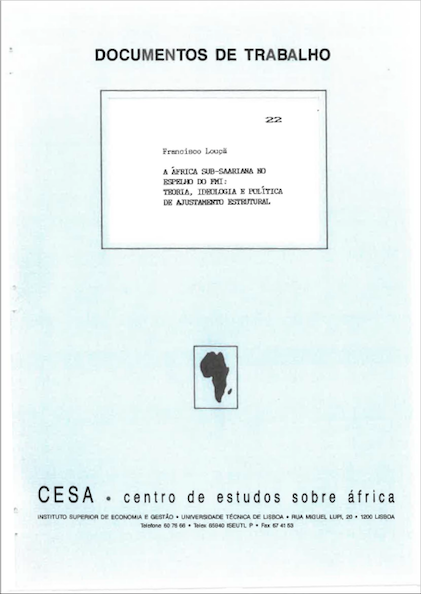
Working Paper 22/1991: A África sub-saariana no espelho do FMI: teoria, ideologia e política de ajustamento estrutural
Abstract:
The International Monetary Fund and the World Bank are undoubtedly two of the most powerful institutions from the point of view of international economic relations. That power has been growing and, in recent years, has acquired an expressive dimension in regulating the economic policy of an increasingly large number of national states: the general orientation that underlies the exercise of that relationship and a comprehensive ideology, which aims both to explain the reasons for the failure of previous economic models and to point out the short- and medium-term solutions for economic and social growth. Thus, never before have so many states simultaneously applied such standardised economic policies as those now resulting from IMF-WB-driven agreements. This is the starting point of A África sub-saariana no espelho do FMI : teoria, ideologia e política de ajustamento estrutural. This historical particularity facilitates the development of the present study. It is possible to approach the economic policies implemented within the framework of “structural adjustments” simultaneously by analysing previous developments, suggesting short-term measures, defining medium-term horizons – and within the framework of economic theory, social policy, development ideology, government action or social agents. And what follows, at the limit of an initial approach to the problem.
Quotation:
Louçã, F. (1991). A África sub-saariana no espelho do FMI : teoria, ideologia e política de ajustamento estrutural. Instituto Superior de Economia e Gestão. CEsA – Documentos de Trabalho nº 22/1991.
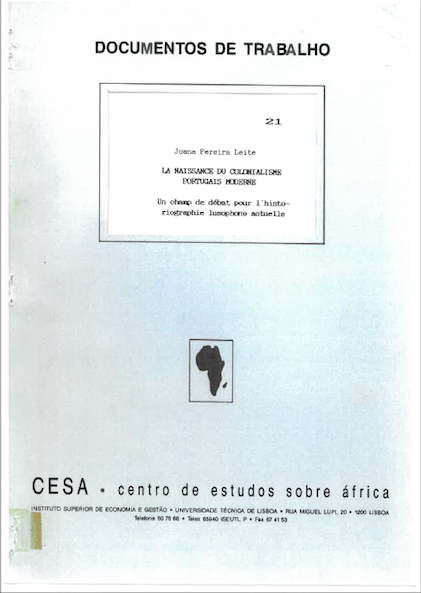
Working Paper 21/1991: La naissance du colonialisme portugais moderne: un champ de débat pour l’historiographie lusophone actuelle
Abstract:
The intention to “make history” of Portuguese colonial policy brought us to the heart of a debate, the centre of Portuguese-speaking historiography: the problematic of the “origins of modern Portuguese colonialism” or “The Third Portuguese Empire”. These new interpretations have, in our opinion, their roots in the “old” debates on the problematic of the “genesis of Portuguese decadence”, especially among the Portuguese-speaking historians of the XVIII and XIX centuries. The origins of modern Portuguese colonisation cannot be understood outside the dynamics of Portuguese society in the 19th century. Thus, the history of Portuguese colonialism in Africa is highly dependent on the analyses proposed by the current historiography of the 19th century in Portugal. It is not our intention, in La naissance du colonialisme portugais moderne: un champ de débat pour l’historiographie lusophone actuelle, to reconcile the two positions mentioned above. However, we cannot resist the temptation to recall here that if it is true that economic interests existed in modern African colonisation, and this under the guise of the historical respect that had to be paid to the heroes of the discoveries (keystones of colonial ideology throughout the history of the Portuguese Empire), the Portuguese fragility in the negotiations that led to the partition was just as true. Moreover, Portugal always put forward its historical right to its African possessions, as it was unable to impose itself through “economic arms”. We shall have the opportunity to recall how this position, in relation to historical rights, was maintained throughout the colonial period, becoming a superior value of the Salazarist ideology.
Quotation:
Leite, Joana Pereira. 1991. “La naissance du colonialisme portugais moderne : un champ de débat pour l’historiographie lusophone actuelle”. Instituto Superior de Economia e Gestão. CEsA – Documentos de Trabalho nº 21/1991.





